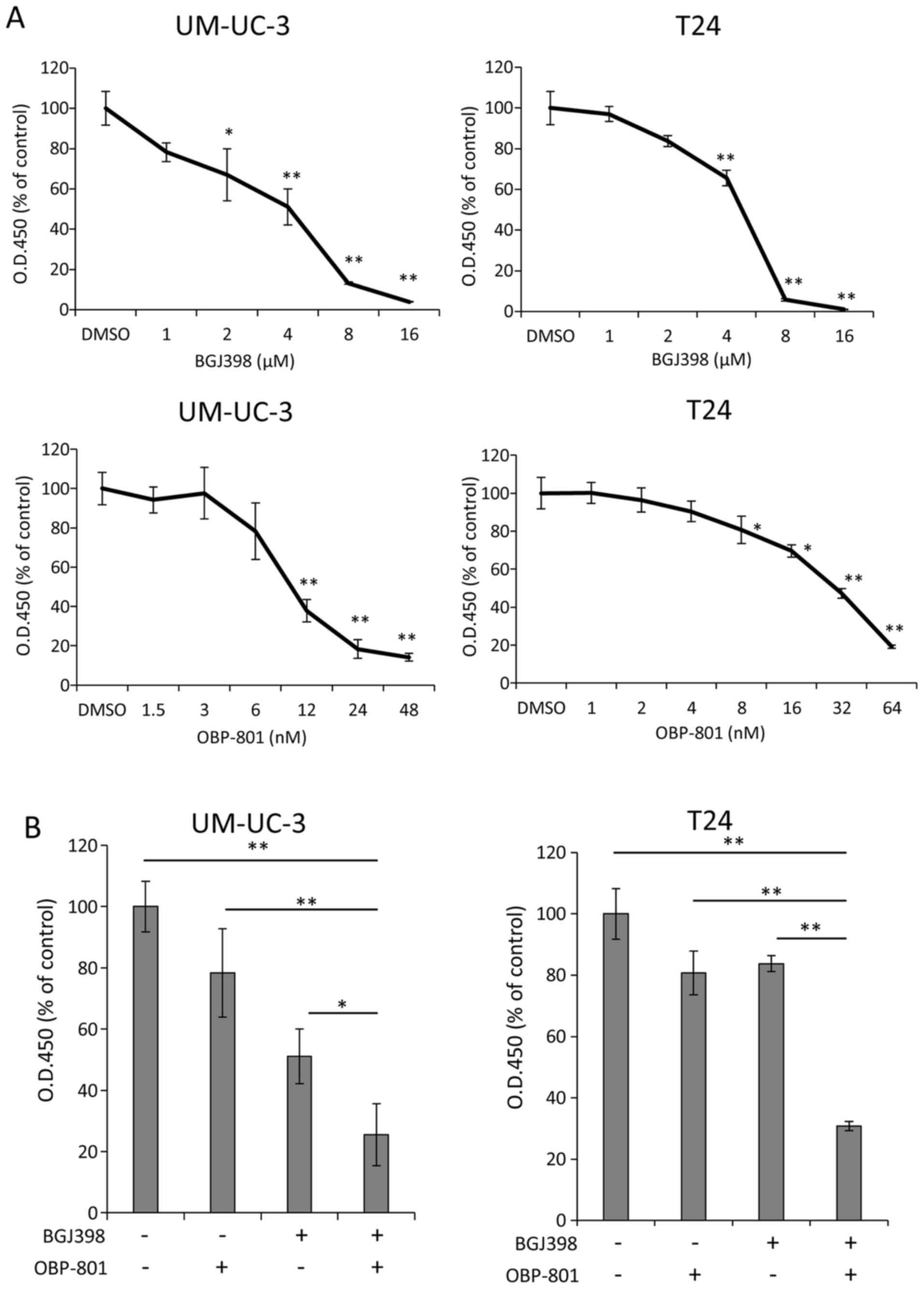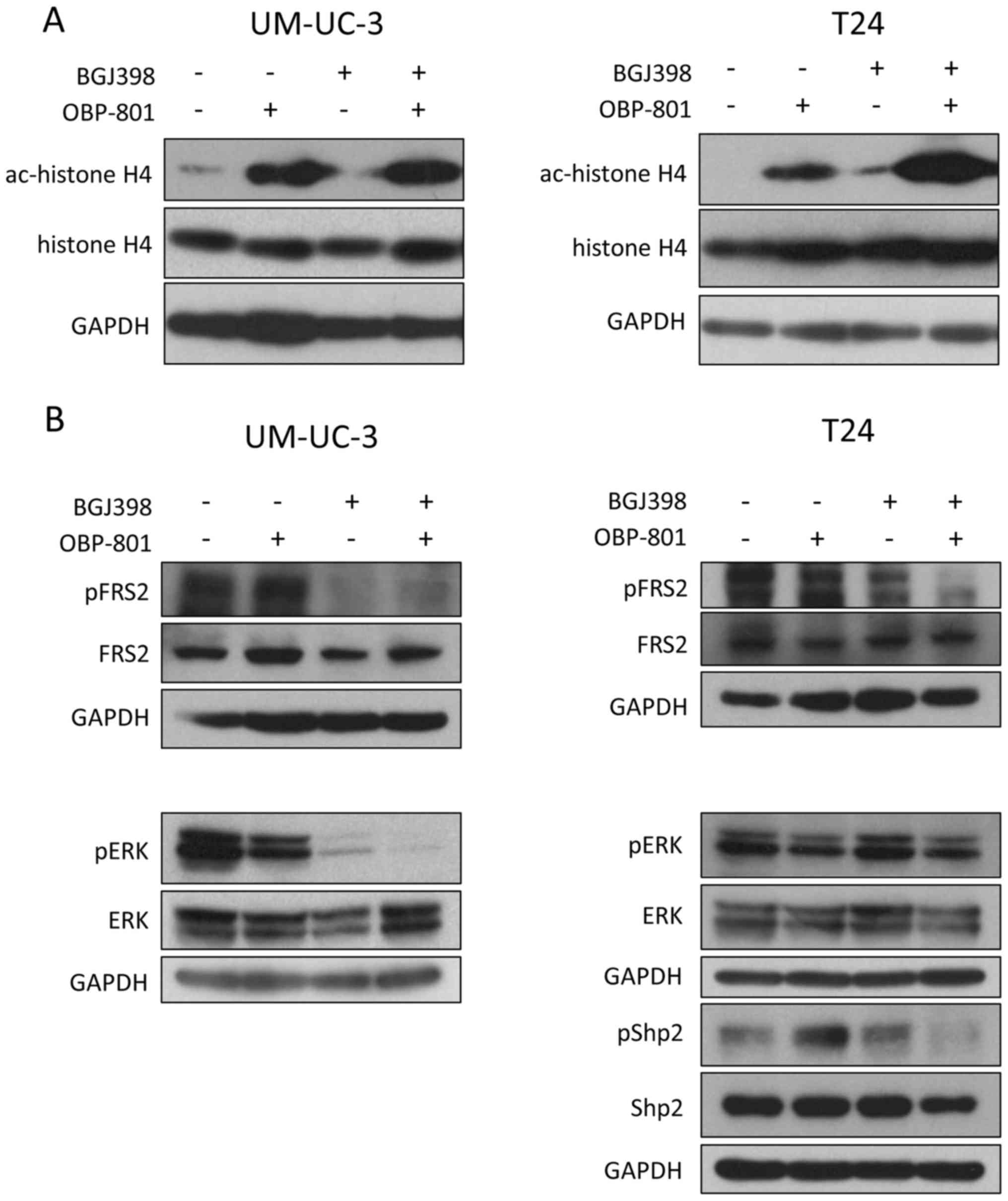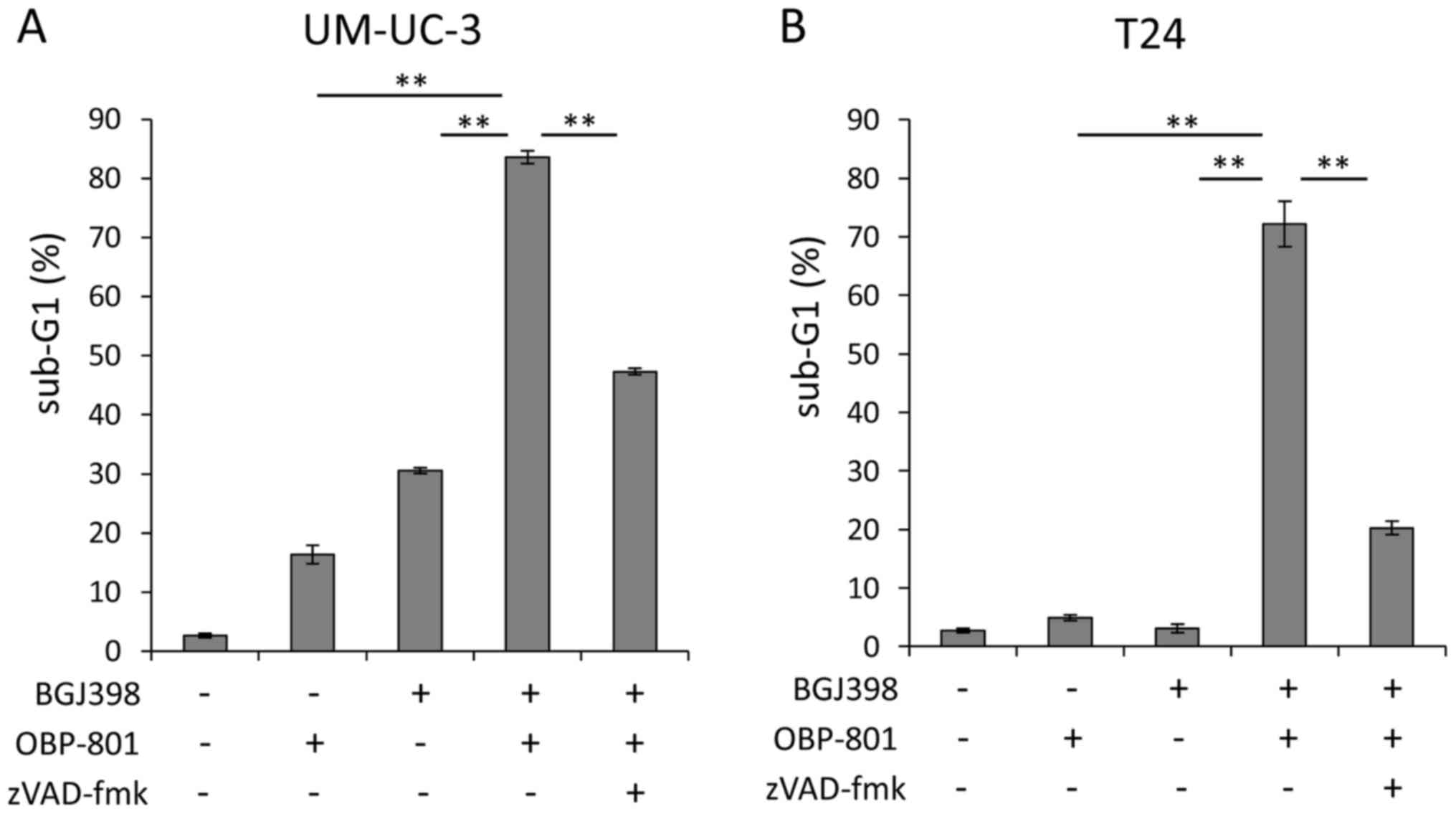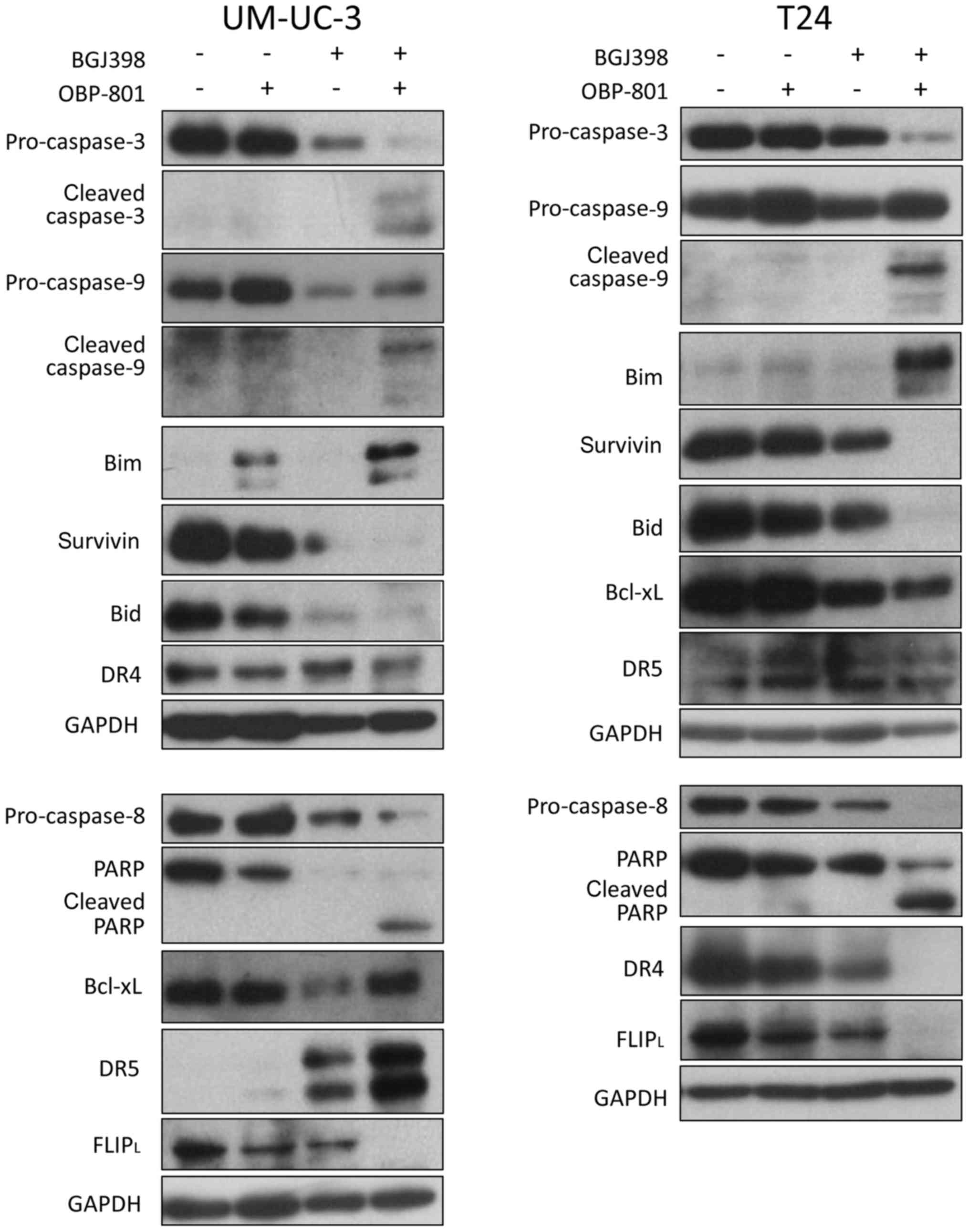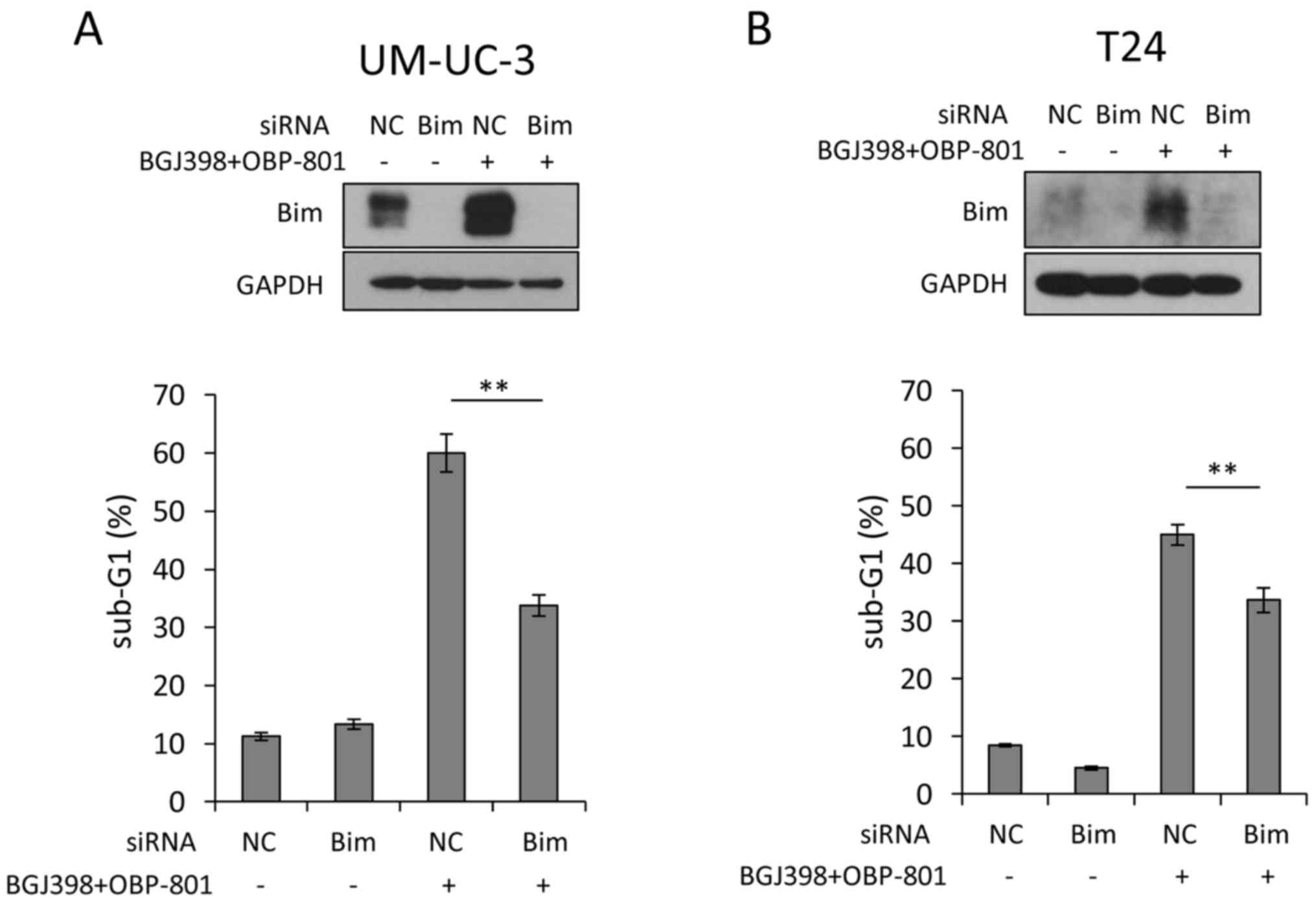|
1
|
Fitzmaurice C, Dicker D, Pain A, Hamavid
H, Moradi-Lakeh M, MacIntyre MF, Allen C, Hansen G, Woodbrook R,
Wolfe C, et al Global Burden of Disease Cancer Collaboration, : The
Global Burden of Cancer 2013. JAMA Oncol. 1:505–527. 2015.
View Article : Google Scholar : PubMed/NCBI
|
|
2
|
von der Maase H, Sengelov L, Roberts JT,
Ricci S, Dogliotti L, Oliver T, Moore MJ, Zimmermann A and Arning
M: Long-term survival results of a randomized trial comparing
gemcitabine plus cisplatin, with methotrexate, vinblastine,
doxorubicin, plus cisplatin in patients with bladder cancer. J Clin
Oncol. 23:4602–4608. 2005. View Article : Google Scholar : PubMed/NCBI
|
|
3
|
Drayton RM and Catto JW: Molecular
mechanisms of cisplatin resistance in bladder cancer. Expert Rev
Anticancer Ther. 12:271–281. 2012. View Article : Google Scholar : PubMed/NCBI
|
|
4
|
Tomlinson DC, Baldo O, Harnden P and
Knowles MA: FGFR3 protein expression and its relationship to
mutation status and prognostic variables in bladder cancer. J
Pathol. 213:91–98. 2007. View Article : Google Scholar : PubMed/NCBI
|
|
5
|
Tomlinson DC, Lamont FR, Shnyder SD and
Knowles MA: Fibroblast growth factor receptor 1 promotes
proliferation and survival via activation of the mitogen-activated
protein kinase pathway in bladder cancer. Cancer Res. 69:4613–4620.
2009. View Article : Google Scholar : PubMed/NCBI
|
|
6
|
Turner N and Grose R: Fibroblast growth
factor signalling: From development to cancer. Nat Rev Cancer.
10:116–129. 2010. View
Article : Google Scholar : PubMed/NCBI
|
|
7
|
Klint P and Claesson-Welsh L: Signal
transduction by fibroblast growth factor receptors. Front Biosci.
4:D165–D177. 1999. View
Article : Google Scholar : PubMed/NCBI
|
|
8
|
Cancer Genome Atlas Research Network, .
Comprehensive molecular characterization of urothelial bladder
carcinoma. Nature. 507:315–322. 2014. View Article : Google Scholar : PubMed/NCBI
|
|
9
|
Lim S, Koh MJ, Jeong HJ, Cho NH, Choi YD,
Cho Y, Lee HY and Rha SY: Fibroblast growth factor receptor 1
overexpression is associated with poor survival in patients with
resected muscle invasive urothelial carcinoma. Yonsei Med J.
57:831–839. 2016. View Article : Google Scholar : PubMed/NCBI
|
|
10
|
Nogova L, Sequist LV, Perez Garcia JM,
Andre F, Delord JP, Hidalgo M, Schellens JH, Cassier PA, Camidge
DR, Schuler M, et al: Evaluation of BGJ398, a fibroblast growth
factor receptor 1–3 kinase inhibitor, in patients with advanced
solid tumors harboring genetic alterations in fibroblast growth
factor receptors: Results of a global phase I, dose-escalation and
dose-expansion study. J Clin Oncol. 35:157–165. 2017. View Article : Google Scholar : PubMed/NCBI
|
|
11
|
Cheng T, Roth B, Choi W, Black PC, Dinney
C and McConkey DJ: Fibroblast growth factor receptors-1 and −3 play
distinct roles in the regulation of bladder cancer growth and
metastasis: Implications for therapeutic targeting. PLoS One.
8:e572842013. View Article : Google Scholar : PubMed/NCBI
|
|
12
|
Li QQ, Hao JJ, Zhang Z, Hsu I, Liu Y, Tao
Z, Lewi K, Metwalli AR and Agarwal PK: Histone deacetylase
inhibitor-induced cell death in bladder cancer is associated with
chromatin modification and modifying protein expression: A
proteomic approach. Int J Oncol. 48:2591–2607. 2016.PubMed/NCBI
|
|
13
|
Jeon HG, Yoon CY, Yu JH, Park MJ, Lee JE,
Jeong SJ, Hong SK, Byun SS and Lee SE: Induction of caspase
mediated apoptosis and down-regulation of nuclear factor-κB and Akt
signaling are involved in the synergistic antitumor effect of
gemcitabine and the histone deacetylase inhibitor trichostatin A in
human bladder cancer cells. J Urol. 186:2084–2093. 2011. View Article : Google Scholar : PubMed/NCBI
|
|
14
|
Wang D, Jing Y, Ouyang S, Liu B, Zhu T,
Niu H and Tian Y: Inhibitory effect of valproic acid on bladder
cancer in combination with chemotherapeutic agents in vitro and in
vivo. Oncol Lett. 6:1492–1498. 2013.PubMed/NCBI
|
|
15
|
Li DR, Zhang H, Peek E, Wang S, Du L, Li G
and Chin AI: Synergy of histone-deacetylase inhibitor AR-42 with
cisplatin in bladder cancer. J Urol. 194:547–555. 2015. View Article : Google Scholar : PubMed/NCBI
|
|
16
|
Shindoh N, Mori M, Terada Y, Oda K, Amino
N, Kita A, Taniguchi M, Sohda KY, Nagai K, Sowa Y, et al: YM753, a
novel histone deacetylase inhibitor, exhibits antitumor activity
with selective, sustained accumulation of acetylated histones in
tumors in the WiDr xenograft model. Int J Oncol. 32:545–555.
2008.PubMed/NCBI
|
|
17
|
Toriyama S, Horinaka M, Yasuda S,
Taniguchi T, Aono Y, Takamura T, Morioka Y, Miki T, Ukimura O and
Sakai T: A histone deacetylase inhibitor, OBP-801, and celecoxib
synergistically inhibit the cell growth with apoptosis via a
DR5-dependent pathway in bladder cancer cells. Mol Cancer Ther.
15:2066–2075. 2016. View Article : Google Scholar : PubMed/NCBI
|
|
18
|
Youle RJ and Strasser A: The BCL-2 protein
family: Opposing activities that mediate cell death. Nat Rev Mol
Cell Biol. 9:47–59. 2008. View
Article : Google Scholar : PubMed/NCBI
|
|
19
|
Balmanno K and Cook SJ: Tumour cell
survival signalling by the ERK1/2 pathway. Cell Death Differ.
16:368–377. 2009. View Article : Google Scholar : PubMed/NCBI
|
|
20
|
Ley R, Balmanno K, Hadfield K, Weston C
and Cook SJ: Activation of the ERK1/2 signaling pathway promotes
phosphorylation and proteasome-dependent degradation of the
BH3-only protein, Bim. J Biol Chem. 278:18811–18816. 2003.
View Article : Google Scholar : PubMed/NCBI
|
|
21
|
Ferguson BS, Harrison BC, Jeong MY, Reid
BG, Wempe MF, Wagner FF, Holson EB and McKinsey TA:
Signal-dependent repression of DUSP5 by class I HDACs controls
nuclear ERK activity and cardiomyocyte hypertrophy. Proc Natl Acad
Sci USA. 110:pp. 9806–9811. 2013; View Article : Google Scholar : PubMed/NCBI
|
|
22
|
Zhang J, Zhang F and Niu R: Functions of
Shp2 in cancer. J Cell Mol Med. 19:2075–2083. 2015.PubMed/NCBI
|
|
23
|
Yang W, Klaman LD, Chen B, Araki T, Harada
H, Thomas SM, George EL and Neel BG: An Shp2/SFK/Ras/Erk signaling
pathway controls trophoblast stem cell survival. Dev Cell.
10:317–327. 2006. View Article : Google Scholar : PubMed/NCBI
|
|
24
|
Selimoglu-Buet D, Gallais I, Denis N,
Guillouf C and Moreau-Gachelin F: Oncogenic kit triggers
Shp2/Erk1/2 pathway to down-regulate the pro-apoptotic protein Bim
and to promote apoptosis resistance in leukemic cells. PLoS One.
7:e490522012. View Article : Google Scholar : PubMed/NCBI
|















